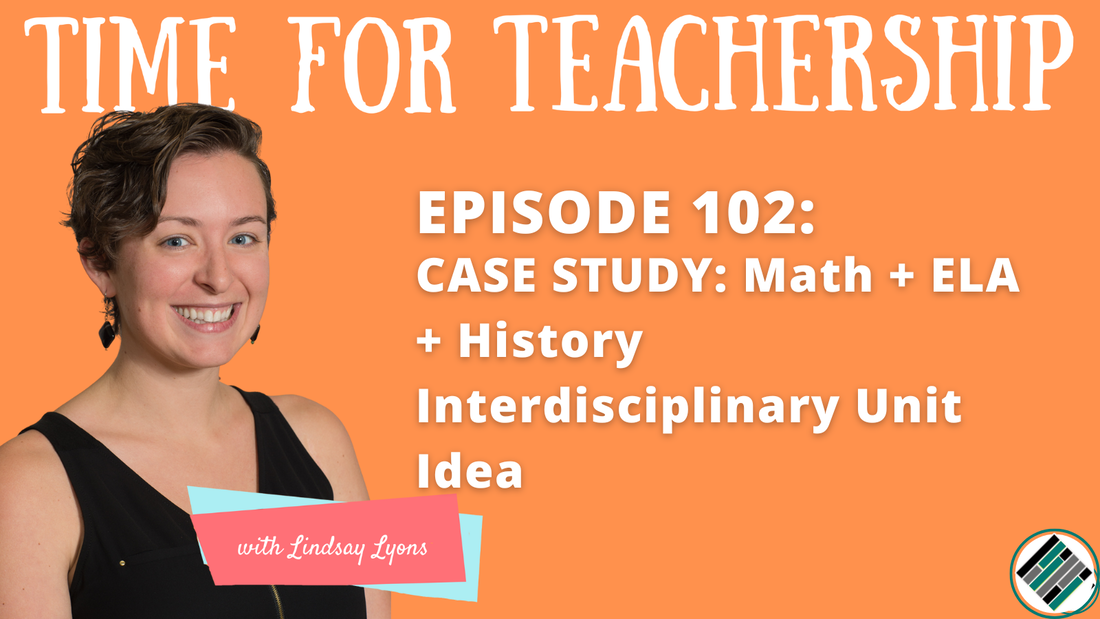
Listen to the episode by clicking the link to your preferred podcast platform below:
I love the idea of inviting listeners and readers to share an idea for an interdisciplinary unit idea. If you’re interested in sharing a topic, question, or resource you want to develop a unit around or coach teachers to develop a unit around, let me know in the comments below or reach out via email. This episode is a glimpse into my own brain’s process of taking a unit idea from a text I heard (and loved) to a full unit outline.
Why support the design of interdisciplinary units? From the research (and from practice), we know interdisciplinary units deepen understanding and nurtures students’ creative genius. Interdisciplinary unit questions and projects enable students to make connections and innovative applications relevant to their lives. This means learners are more engaged than in a siloed curriculum. Finally, it presents a wider range of options for students to advance justice in different areas and supports what Westheimer and Kahne call “justice-oriented citizenship.” Inspiration to Interdisciplinary Unit Outline: What is the process? Note: For context, I’m envisioning a Math, ELA, and Social Studies interdisciplinary unit, so I’ll brainstorm with those content areas in mind. Step 1: Inspiration. I was inspired by a poem by 2018 MacArthur Fellow, Natalie Diaz, called, “American Arithmetic.” Step 2: Brainstorm Initial Connections to Subjects. ELA: Literary choices and connections to lived experience and emotion. Social Studies: Histories and present day perspectives of indigenous people, the origins of the concept of race, and systems of governance and equitable representation. Math: Students’ experiences of math. Step 3: Essential Question. This is a year-long question that is relevant in all of a year’s units, even each lesson can connect to the EQ. Possible EQ: Is math more likely to mask injustice or make it visible? In a math class, we can visibility to statistics, geometry (e.g., gerrymandering), algebra (e.g., intersectionality). Step 4: Driving Question. This is a unit-specific question. In an interdisciplinary unit, this is used in all classes. Possible Question: What is the most powerful strategy to advance justice for indigenous peoples: math, language/poetry, or history? This enables students to create an argument for the subject area they most gravitate toward. Step 5: Project Idea. The project is the way students can answer/address the DQ. Possible idea: Performance poetry with math visuals in background. (I’m thinking something similar to how Hasan Minaj used visual graphs and images to do political commentary on his show, Patriot Act. Step 6: Lesson-Specific Activities or “Texts.” I aim for one “text” (resource) and one protocol (activity) per lesson. Possible text ideas: clips from Hasan Minaj’s show Patriot Act (use for project medium inspiration); Dr. John Littlewolf’s poem (he read this on episode 34 of the podcast); research on the longstanding injustice of Missing and Murdered Indigenous Women and Girls; and Native-Land.Ca to have students research the land their community occupies. Final Tip Coach each teacher to develop a student-centered unit arc first. This will make it much easier to create new curriculum and build interdisciplinary units.
In lieu of a free resource, I’m inviting you to share a topic, resource, or question that you want to think through. Share your idea or question in the comments below. I might feature it on an episode (or invite you on, if that’s your jam!) And, if you’re looking for more details on the ideas in this blog post, listen to episode 104 the Time for Teachership podcast. If you’re unable to listen or you prefer to read the full episode, you can find the transcript here. Quotes:
Want to continue learning more about curriculum development and implementation? Watch this video on how to develop district curriculum that challenges, affirms, and inspires:
0 Comments
Leave a Reply. |
Details
For transcripts of episodes (and the option to search for terms in transcripts), click here!
Time for Teachership is now a proud member of the...AuthorLindsay Lyons (she/her) is an educational justice coach who works with teachers and school leaders to inspire educational innovation for racial and gender justice, design curricula grounded in student voice, and build capacity for shared leadership. Lindsay taught in NYC public schools, holds a PhD in Leadership and Change, and is the founder of the educational blog and podcast, Time for Teachership. Archives
May 2024
Categories |

 RSS Feed
RSS Feed